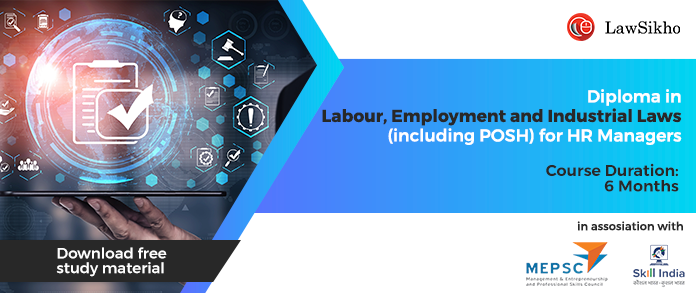ADR is a promising field; developed countries have firms dedicated to mediation and India will adapt to that culture too: Sumit Chander
Sumit Chander has two decades of experience in the field of civil litigation. and practices as an advocate at the Delhi High Court and the Supreme Court of India.
He has been a lawyer for the government of Delhi and the government of India for many years. He has handled many cases, and some of his notable clients include Godrej, Mahindra and Mahindra and MTNL. He is a mediator with the Delhi High Court Mediation and Conciliation Center, Samadhan.
Chander has done an advanced mediation training program from Pepperdine University in California. He has been accredited in commercial mediation by the Indian Institute of Corporate Affairs. He was awarded the National Law Day Award.
In an interview with LawSikho, Sumit Chander shares insights on how to excel in the field of civil litigation and alternative dispute resolution.
Edited excerpts from the interview are below:
Walk us through your professional journey. What were your college days like and how did you carve out such a great journey?
There’s a very famous quote of George Bernard Shaw, which I really believe in even today. It says that, “The young do not know enough to be prudent, hence, they attempt the impossible and achieve it generation after generation”. Because you are young, you don’t know what’s practical, what’s not practical, so you have all the options to achieve and attempt the impossible, and unknowingly you may also achieve it.
I wanted to get into the corporate sector as soon as I graduated. Today the kind of corporate firms you see, did not exist in this form during my time. I graduated in 2002 and my idea was to create a law firm.
I gave it a name, Law Intellect. I created a firm in my mind. I came back home and to encourage me, my father made a print on the letterhead with the name and logo, which I had designed myself. That’s how Law Intellect, my law firm, came into existence.
I approached all the law firms and big corporates and told them that we are a big law firm and I wish to handle cases for you. Maybe, they were impressed by the enthusiasm and confidence of a young law graduate and they did start giving me the cases.
However, I was not able to grow beyond consumer and check bounce cases. So I wrote an email to both these corporate giants and told them that our firm has decided not to take up any further consumer matters or check bounce cases.
Thereafter, I became a government counsel, again, I became very comfortable in that zone and that’s how at each zone I was ready and willing to cross that step and get into something bigger and better.
I would like to know your thoughts on the importance of an internship. How important is an internship in this, journey of pursuing litigation?
Internships are extremely important. You may learn the law in law college, but the practical use of that law is what you get to learn only during internships.
So unless you do the internships, you’ll never be able to successfully implement what you’ve learned in law college. I would recommend that from as early as possible as your college may allow, you must do your internships.
I have come across interns, law students who in that period of one or two months have made me actually depend on them for various things like research work, drafting or organizing the paperwork, which is brilliant. Don’t do internships to get your certificates, but do internships to actually learn.
When I say learn, learn by observing, learn by participating and that will definitely help you. So in, I will always encourage internships.
How can a law student to get an internship at your office?
I’m always very, very happy to have interns. I welcome them, but I have limited space for them, so it’s more on a first come first serve basis. The only thing that it takes to get an internship in my office is an email with your CV, and, unless of course there is something wrong we see in the CV, 99.9%, you’ll always be welcomed.
What do you think are the selection criteria for selecting juniors?
So there is a philosophy which says, if there is somebody who’s very smart and intelligent, keep him. If a person is not very smart or intelligent, but he is very hardworking, prefer him because, with his hard work, he’ll be able to become smart and intelligent but if somebody is neither smart and intelligent, basic smart intelligence and basic hardworking, but is very sincere then prefer him over the other two because sincerity cannot be cultivated. Sincerity comes by nature, by birth. So hard work and intelligence can be developed with time.
You are a mediator with Samadhan, which is the Delhi High Court Mediation and Conciliation Center. As we speak today, where does ADR (alternative dispute resolution) stand in India? How do you see this evolving?
So ADR is a very upcoming field in our country, but that is not the only reason why you should get into ADR. Today courts are already overburdened and there are a lot of litigations and the number of judges, proportionately, are comparatively less. Two of the most important ones as of today are arbitration and mediation.
If you look at the Commercial Courts Act, which has recently come, they make mediation compulsory. In so far as compoundable, small minor offenses are concerned, your Lok Adalat becomes very active. Alternate dispute resolutions and mediation, arbitration, Lok Adalat, and conciliation are all becoming an upcoming force. Now, what is the future?
Now for mediation when you look at foreign law firms, especially in America and UK, the developed countries, you realize that in fact they have law firms, which are mediation firms, entire firms dedicated to mediation.
So that is the future, even India will evolve. There is a bill, which is already been introduced in Parliament, the Mediation Bill. When it will come into existence it will be a very, very strong force. So get prepared and get ready for that future.
What kind of training is required to get into ADR? What difference do you see in training to be an ADR professional in India vis-a-vis other countries?
See internationally it’s a 40 hours mediation training program. Now, the Bar Council of India has made it a rule that a 45 hours of mediation training is important to become a mediator.
I recommend that the youngsters should become part of some mediation training, groups and organizations such as Madhyam for conflict resolution. Maadhyam is a private mediation firm in India, which is very, very active and encourages a lot of youngsters.
If there is a training coming up, please participate and get trained into mediation. So that’s how you move forward in the field of ADR.
How can one be successful in civil litigation?
Read thoroughly the Code of Civil Procedure, Indian Evidence Act. Whenever a case comes to you, you need to prepare on the basis of that fact, on the basis of the subjective law, whichever it involves. So once you are involved into these aspects and you are thorough with your procedural laws, you are bound to succeed. Rest, of course, is practice. The more you do it, the more involved you are, the better you grow.
Are there any particular critical skillset that you advise law students to inculcate at early on in life?
Some law colleges have started a course in advocacy skills. Now, when we talk about those skills, I believe the most important thing, that you need to learn is the art of communication.
If you cannot communicate amongst your friends or your peers, how will you communicate to the judge? If you keep speaking without understanding what the judge wants to hear, you’ll lose your case. If you keep speaking without hearing what your client wants to say, you will lose your client.
Another very important skill set in this profession is to develop the art of not assuming.
Also, please participate in as much as you can. So participate, make mistakes. And learn.
Students of Lawsikho courses regularly produce writing assignments and work on practical exercises as a part of their coursework and develop themselves in real-life practical skills.
LawSikho has created a telegram group for exchanging legal knowledge, referrals, and various opportunities. You can click on this link and join:
Follow us on Instagram and subscribe to our YouTube channel for more amazing legal content.
 Serato DJ Crack 2025Serato DJ PRO Crack
Serato DJ Crack 2025Serato DJ PRO Crack











 Allow notifications
Allow notifications


